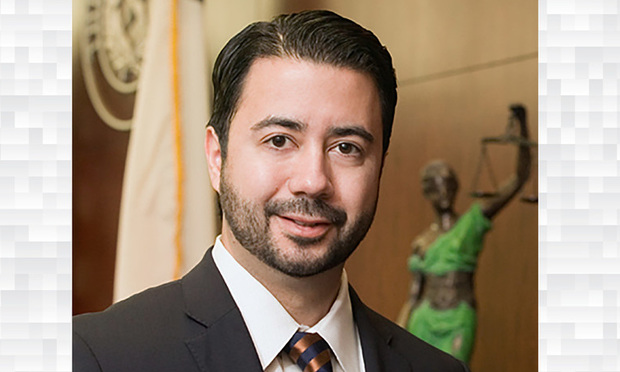Appellate Lawyer of the Week: Houston Attorney Wins Big Decision Forcing Hospitals to Disclose Insurance Reimbursement Rates
Houston attorney James Amaro just won a decision from the Texas Supreme Court that will force hospitals to show the difference in the reimbursement rates paid by insured patients and uninsured patients when they attempt to recover costs from civil litigants.
May 02, 2018 at 06:11 PM
5 minute read

There's usually a big difference between was is billed and what is owed to a hospital when a patient makes a trip to an emergency room.
And Houston attorney James Amaro just won a decision from the Texas Supreme Court that will force hospitals to show the difference in the reimbursement rates paid by insured patients and uninsured patients when they attempt to recover costs from civil litigants.
Amaro represents Crystal Roberts, who was involved in a 2015 car accident and was taken by ambulance to North Cypress Medical Center, where she was released after staff performed a series of X-rays, CT scans, and other emergency services.
Because Roberts was uninsured, North Cypress billed her for the full “chargemaster” price, which totaled $11,037. North Cypress then filed a hospital lien against Roberts under Chapter 55 of the Texas Property Code, which allows hospitals to assert liens against causes of actions filed by people who receive emergency services for injuries caused by the negligence of another person.
The liability insurer of the driver at fault offered to settle Roberts' claim for $17,380, attributing $9,404 to past medical expenses. Roberts sought a reduction of North Cypress's bill and the parties negotiated but could not reach an agreement on the bill's amount.
Roberts then sued North Cypress seeking a declaratory judgment that the hospital's charges were unreasonable and its lien invalid to the extent it exceeds a “reasonable and regular rate” as is required by the hospital lien statute.
During discovery, Roberts requested that North Cypress produce documents indicating the reduced rates for services it provided to patients covered by numerous insurance companies, including Aetna and Blue Cross Blue Shield. But North Cypress objected to the discovery requests and moved for a protective order asserting that Roberts' request was seeking irrelevant and overly broad.
The trial court later ordered North Cypress to produce the information, but narrowed the request to a specific time period. North Cypress then filed a petition for writ of mandamus with Houston's 14th Court of Appeals, which was denied, prompting the hospital to take its mandamus to the Texas Supreme Court.
The high court had to decide whether the reimbursement rates paid by insured patients were relevant to Roberts' case.
The case caught the attention of six amici, most of them groups involved in the medical industry that opposed requiring hospitals to disclose their reimbursement rates in lien disputes for fear they could open up hospitals to a flood of litigation similar to Roberts' case.
But in a 6-3 decision, the Supreme Court denied the hospital's writ of mandamus, ruling that North Cypress had to disclose its insured patient reimbursement rates to Roberts.
“The reimbursement rates sought, taken together, reflect the amounts the hospital is willing to accept from the vast majority of its patients as payment in full for such services,” wrote Justice Debra Lehrmann in the majority decision. “While not dispositive, such amounts are at least relevant to what constitutes a reasonable charge.”
“As noted, considered together, reimbursements from insurers and government payers comprise the bulk of a hospital's income for services rendered,” Lehrmann continued. “It defies logic to conclude that those payments have nothing to do with the reasonableness of charges to the small number of patients who pay directly.”
Chief Justice Nathan Hecht dissented, writing that he would have granted the mandamus while noting the amici's concerns that when hospitals are faced with this kind of litigation, they will simply cave in to the demands of uninsured patients and attempt the shift the costs to insured patients.
Amaro, who represented Roberts in the trial court as well as on appeal, said the decision he won will give ammunition to thousands of patients who are presented with excessive hospital bill liens.
“Without a doubt, excessive hospital billing is a problem that effects all of us. And that the hospitals are taking advantage of the hospital lien statute against people when they are in the most vulnerable circumstances,” Amaro said.
“It effects people that are hurt on the job that have managed providers, it effects a run-of-the-mill car wreck situation whether the patient has representation or not. And sometimes if the hospital sues the patient and gets a default judgment, that follows in a person's credit rating for the rest of their lives,” Amaro said.
“I think fighting this case against the hospital was the right thing for a lot of reasons. And I hope this case will curb excessive hospital billing and the pursuit of collection efforts on those phony bills,” Amaro said. “And I believe the court gave voice to thousands of vulnerable people by giving them a mechanism to challenge the liens.''
Chad Ruback, a Dallas attorney who represented North Cypress on appeal, declined to comment on the decision but noted the hospital will file a motion for rehearing with the Supreme Court.
This content has been archived. It is available through our partners, LexisNexis® and Bloomberg Law.
To view this content, please continue to their sites.
Not a Lexis Subscriber?
Subscribe Now
Not a Bloomberg Law Subscriber?
Subscribe Now
NOT FOR REPRINT
© 2025 ALM Global, LLC, All Rights Reserved. Request academic re-use from www.copyright.com. All other uses, submit a request to [email protected]. For more information visit Asset & Logo Licensing.
You Might Like
View All
State Bar Ethics Opinion Determines Texas Lawyers Can't Join a Firm With Non-Lawyer Partners
2 minute read

Jones Day Names New Practice Leaders for Antitrust, Business and Tort Litigation and Latin America

Trending Stories
- 1Parties’ Reservation of Rights Defeats Attempt to Enforce Settlement in Principle
- 2ACC CLO Survey Waves Warning Flags for Boards
- 3States Accuse Trump of Thwarting Court's Funding Restoration Order
- 4Microsoft Becomes Latest Tech Company to Face Claims of Stealing Marketing Commissions From Influencers
- 5Coral Gables Attorney Busted for Stalking Lawyer
Who Got The Work
J. Brugh Lower of Gibbons has entered an appearance for industrial equipment supplier Devco Corporation in a pending trademark infringement lawsuit. The suit, accusing the defendant of selling knock-off Graco products, was filed Dec. 18 in New Jersey District Court by Rivkin Radler on behalf of Graco Inc. and Graco Minnesota. The case, assigned to U.S. District Judge Zahid N. Quraishi, is 3:24-cv-11294, Graco Inc. et al v. Devco Corporation.
Who Got The Work
Rebecca Maller-Stein and Kent A. Yalowitz of Arnold & Porter Kaye Scholer have entered their appearances for Hanaco Venture Capital and its executives, Lior Prosor and David Frankel, in a pending securities lawsuit. The action, filed on Dec. 24 in New York Southern District Court by Zell, Aron & Co. on behalf of Goldeneye Advisors, accuses the defendants of negligently and fraudulently managing the plaintiff's $1 million investment. The case, assigned to U.S. District Judge Vernon S. Broderick, is 1:24-cv-09918, Goldeneye Advisors, LLC v. Hanaco Venture Capital, Ltd. et al.
Who Got The Work
Attorneys from A&O Shearman has stepped in as defense counsel for Toronto-Dominion Bank and other defendants in a pending securities class action. The suit, filed Dec. 11 in New York Southern District Court by Bleichmar Fonti & Auld, accuses the defendants of concealing the bank's 'pervasive' deficiencies in regards to its compliance with the Bank Secrecy Act and the quality of its anti-money laundering controls. The case, assigned to U.S. District Judge Arun Subramanian, is 1:24-cv-09445, Gonzalez v. The Toronto-Dominion Bank et al.
Who Got The Work
Crown Castle International, a Pennsylvania company providing shared communications infrastructure, has turned to Luke D. Wolf of Gordon Rees Scully Mansukhani to fend off a pending breach-of-contract lawsuit. The court action, filed Nov. 25 in Michigan Eastern District Court by Hooper Hathaway PC on behalf of The Town Residences LLC, accuses Crown Castle of failing to transfer approximately $30,000 in utility payments from T-Mobile in breach of a roof-top lease and assignment agreement. The case, assigned to U.S. District Judge Susan K. Declercq, is 2:24-cv-13131, The Town Residences LLC v. T-Mobile US, Inc. et al.
Who Got The Work
Wilfred P. Coronato and Daniel M. Schwartz of McCarter & English have stepped in as defense counsel to Electrolux Home Products Inc. in a pending product liability lawsuit. The court action, filed Nov. 26 in New York Eastern District Court by Poulos Lopiccolo PC and Nagel Rice LLP on behalf of David Stern, alleges that the defendant's refrigerators’ drawers and shelving repeatedly break and fall apart within months after purchase. The case, assigned to U.S. District Judge Joan M. Azrack, is 2:24-cv-08204, Stern v. Electrolux Home Products, Inc.
Featured Firms
Law Offices of Gary Martin Hays & Associates, P.C.
(470) 294-1674
Law Offices of Mark E. Salomone
(857) 444-6468
Smith & Hassler
(713) 739-1250






